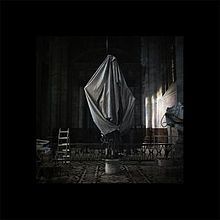 Canadian ambient music veteran Tim Hecker follows his 2011 album ‘Ravedeath, 1972’ with this, his highly-anticipated seventh album; ‘Virgins’. While his previous effort was deservedly lauded for it’s immersing layers of droning noises and live piano multitracking, and its success in producing a pensive, post-disastrous tone, ‘Virgins’ is a more than worthy follow-up. Hecker proves himself to be an incredibly forward-thinking producer, pushing his already thick layers of soundscapes, live piano and high fidelity mastering even further. The overall feel of the album, however, is less ominous this time around.
Canadian ambient music veteran Tim Hecker follows his 2011 album ‘Ravedeath, 1972’ with this, his highly-anticipated seventh album; ‘Virgins’. While his previous effort was deservedly lauded for it’s immersing layers of droning noises and live piano multitracking, and its success in producing a pensive, post-disastrous tone, ‘Virgins’ is a more than worthy follow-up. Hecker proves himself to be an incredibly forward-thinking producer, pushing his already thick layers of soundscapes, live piano and high fidelity mastering even further. The overall feel of the album, however, is less ominous this time around.
While ‘Virgins’ maintains Hecker’s knack for dynamics, knowing exactly where to use minimal instrumentation in contrast with the cacophonous drones; it manages to present itself in a very immediate sense. The attention to detail regarding the arrangement of the tracks (tracks being a key word here, as none of these pieces could really be called songs) is one of the most important aspects of this album’s success in engaging the listener. Several tracks build in force quickly rather than keeping the listener waiting for a crescendo.
As far as the musical performance on ‘Virgins’ goes, Tim Hecker adds harmonium to his arsenal of piano, synth and subtle woodwind instrumentation. The album comprises pre-recorded tracks that Hecker painstakingly cuts, pastes, reverses and interpolates, stirring them as if blending several licks of similar shades of masonry paint before lathering the outside of his house with the mixture, flicking the brush at the odd spot here and there. Hecker uses sound manipulation at will and somehow still captures the spontaneity of the original recordings, which are stacked on top of each other to create the hums and vibes for which he is renowned. Though this may seem overbearing at first, some very stimulating motifs and chord progressions shine through, brighter and clearer with each listen.
The album is emotionally difficult. Though melancholic for the most part, there are many bright, vivid moments. Prisms – the album’s opener, for example – makes use of searing sustained vibes and dubbed backmasked piano, building to an imposing, disorientating sound before giving way to the second track Virginal; a sparse, piano-driven track that sees Hecker layer the same piano piece over and over again in such a way that the pianos could be singing in a round. One loop starts, the next one starts a split second later and so on, the listener recognising one part of a sequence just as they hear another part of another sequence that they’ve certainly already heard. There are small alterations to each loop, but the layers thicken and thicken until enveloping the listener and eventually winding down towards the track’s end.
While certain motifs and techniques to reoccur throughout ‘Virgins’, the album doesn’t feel repetitive. While it does have the notion of completion and cohesion about it, there are moments of disjointedness and fracturedness that allow the listener to come up for air.
Highlighting tracks from ‘Virgins’ is a futile and near-impossible task. Tim Hecker has produced an album that is simply one of the most stunningly beautiful, cohesive, coherent of the year and of its genre. ‘Virgins’ requires lengthy, attentive, all-in-one-sitting listens to be truly appreciated but this is a practice that guarantees rewards.

